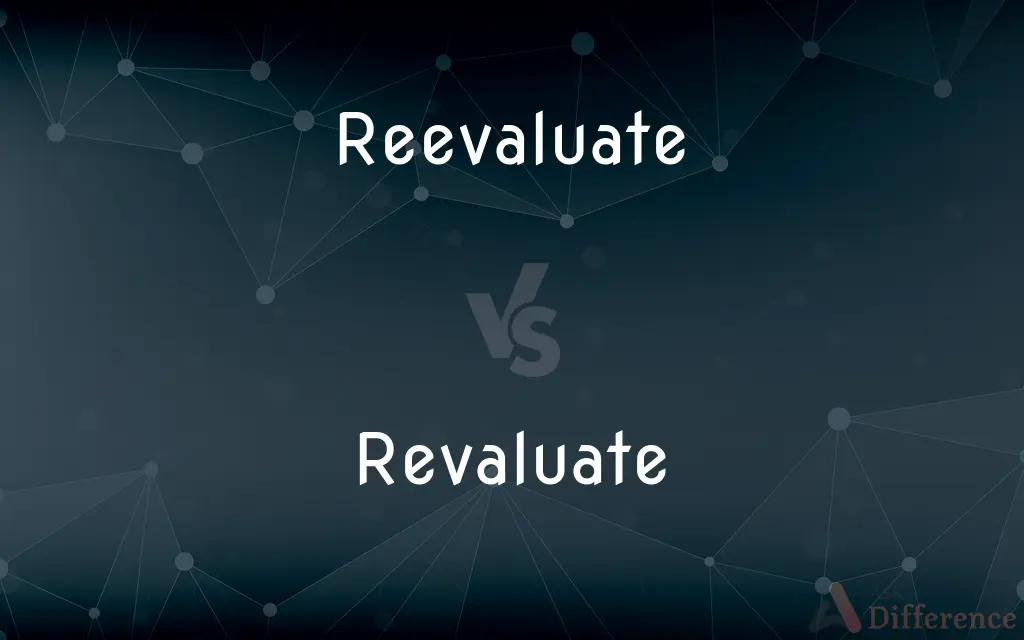Reevaluate vs. Revaluate — What's the Difference?
By Tayyaba Rehman & Maham Liaqat — Updated on March 24, 2024
Reevaluate means to assess again, often considering new factors, while revaluate involves adjusting the value of something, typically in financial terms.

Difference Between Reevaluate and Revaluate
Table of Contents
ADVERTISEMENT
Key Differences
Reevaluating is the process of reviewing or assessing something again, possibly with new information or insights that prompt a reconsideration of previous conclusions or values. It's a term often used in contexts where strategies, decisions, or beliefs are analyzed in light of new evidence or changes in circumstances. On the other hand, revaluating usually refers to a reassessment or adjustment of the value of an asset, currency, or commodity, often in response to market changes or new appraisals.
When you reevaluate, the focus is on a comprehensive reassessment that might lead to changes in understanding, perspective, or approach. It implies a deep, reflective process that can apply to a wide range of scenarios, from personal beliefs to business strategies. Revaluating, however, tends to be more specific and quantitative, mainly dealing with financial or material assets, and is driven by factors like market dynamics, economic policies, or asset conditions.
Reevaluation is a critical skill in dynamic environments, enabling individuals and organizations to adapt to new information or changed conditions. It involves questioning and potentially altering previous assessments based on a thorough analysis of current data. Conversely, revaluation is a financial maneuver that adjusts values on balance sheets, influences investment decisions, and can have significant economic implications, such as affecting inflation rates or international trade.
The need to reevaluate often arises from shifts in personal life, technological advancements, or evolving social norms, requiring a fresh look at existing methods or beliefs. Revaluation, however, is frequently triggered by external economic factors, such as changes in currency exchange rates or alterations in asset market values, necessitating adjustments to reflect true worth accurately.
Both reevaluation and revaluation are crucial for maintaining accuracy and relevance, whether in personal decision-making, business strategy, or financial accounting. While reevaluation is broader, touching on any aspect that might benefit from a second look, revaluation is narrower, focusing on the financial or material valuation of assets.
ADVERTISEMENT
Comparison Chart
Definition
To assess or examine something again, often to reconsider previous conclusions.
To adjust or change the value of something, usually a financial asset.
Context
Broad, can apply to decisions, strategies, beliefs, etc.
Primarily financial, relating to the value of assets, currencies, etc.
Trigger
New information, changed circumstances, or evolved perspectives.
Market dynamics, economic policies, or changes in asset conditions.
Outcome
May lead to changes in understanding, approach, or strategy.
Results in adjusted financial valuations or perceptions of worth.
Scope
General, involving a wide range of scenarios.
Specific, mostly confined to financial or economic contexts.
Compare with Definitions
Reevaluate
A process of reassessing one's decisions or strategies.
After the project's failure, the team decided to reevaluate their approach.
Revaluate
Focuses on adjusting the monetary value of assets.
The firm had to revaluate its investments after the market crash.
Reevaluate
Can lead to significant changes in beliefs or plans.
The company will reevaluate its expansion plans due to the economic downturn.
Revaluate
Can affect financial reporting and taxes.
Businesses may need to revaluate assets for accurate financial statements.
Reevaluate
Encourages a flexible and open-minded approach.
Ongoing feedback is crucial to reevaluate and improve teaching methods.
Revaluate
Affects international trade and currency exchange.
A revaluation of the currency made exports more expensive and imports cheaper.
Reevaluate
Involves considering new information or perspectives.
Recent scientific discoveries have led us to reevaluate our understanding of climate change.
Revaluate
Often results from economic or market changes.
The country's currency was revaluated to combat inflation.
Reevaluate
Is essential for personal growth and adaptation.
She took some time off to reevaluate her career goals and aspirations.
Revaluate
Plays a key role in investment strategies.
Investors often revaluate their portfolios to optimize returns.
Reevaluate
Alternative spelling of re-evaluate
Revaluate
Revaluate is artificial intelligence for the real estate and mortgage industry. Revaluate segments lists and databases for marketers by propensity to move.
Reevaluate
Revise or renew one's assessment
Revaluate
To make a new valuation of.
Revaluate
To increase the exchange value of (a nation's currency).
Revaluate
(transitive) To make a new valuation or appraisal of.
Common Curiosities
What is the purpose of revaluating?
The purpose of revaluating is to adjust the monetary value of an asset or currency based on current market conditions or new appraisals.
How does reevaluation differ from revaluation?
Reevaluation involves a broad reassessment of decisions, strategies, or beliefs, while revaluation specifically refers to adjusting the financial value of assets or currencies.
Can both terms apply to personal finance?
Yes, both can apply to personal finance: reevaluating one's financial goals or strategies, and revaluating the worth of personal assets or investments.
Are these processes exclusive to financial contexts?
Reevaluation is not exclusive to financial contexts and can apply to various aspects of life and business. Revaluation, however, is primarily used in financial or economic contexts.
What does it mean to reevaluate?
To reevaluate means to assess or consider something again, possibly with new information or changed circumstances, to determine if previous conclusions or values are still valid.
What leads to the need for revaluation?
Economic factors, market fluctuations, or changes in asset conditions can necessitate revaluation.
Does revaluation always result in financial gain?
Not necessarily; revaluation can lead to increases or decreases in the perceived value of an asset, affecting net worth positively or negatively.
How often should one reevaluate or revaluate?
The frequency depends on individual circumstances, market dynamics, and the availability of new information. Regular reviews are advisable for both processes.
Is reevaluation a personal or professional process?
It can be both, as individuals might reevaluate personal beliefs or life choices, and organizations might reassess business strategies or operations.
What can trigger a reevaluation?
Triggers can include new information, failure of a plan, personal life changes, or shifts in societal norms.
Share Your Discovery

Previous Comparison
Drain vs. Scupper
Next Comparison
Pulley vs. TrolleyAuthor Spotlight
Written by
Tayyaba RehmanTayyaba Rehman is a distinguished writer, currently serving as a primary contributor to askdifference.com. As a researcher in semantics and etymology, Tayyaba's passion for the complexity of languages and their distinctions has found a perfect home on the platform. Tayyaba delves into the intricacies of language, distinguishing between commonly confused words and phrases, thereby providing clarity for readers worldwide.
Co-written by
Maham Liaqat












































